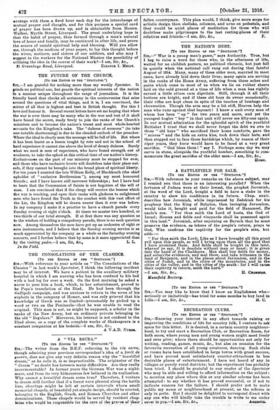THE FUTURE OF THE CHURCH.
[To THE EDITOR OF THE '" SPECTATOR."] Bra,—I am grateful for nothing more than my weekly Spectator. It grinds no political axe, but guards the spiritual interests of the nation In a manner unique throughout the range of journalism. It is the friendly hand that checks all acrimony in the controversies that arise around the questions of vital things, and it is, I am convinced, the mirror of all that is highest and best in British thought. For this I love and honour it. Several recent letters have set mo hoping that when the war is over there may be many who in the woo and test of it shall have found the secret, ready freely to join the ranks of the Church's ministers and to become the nation's truest and most whole-hearted servants for the Kingdom's sake. The "dulness of sermons" (to take one notable shortcoming) is duo to the clouded outlook of the preacher. Where the ideal is clearly seen the message will be full of life. But where it has been learnt as a lesson taught by rote and not in the school of hard experience it cannot rise above the level of dreary dulness. Surely what wo need is men of experience, who have found strength out of weakness, to take the ephod at this critical time of our nation's history. Exclusiveness on the part of our ministry must be stopped for ever, and those who have exclusive hearts will doubtless take their place out- side, if they cannot be brought into the broad place of spiritual liberty. For ten years I counted the late William Kelly, of Blackheath (the chief upholder of " exclusive Brethrenism "), among my most honoured friends ; and I have known still narrower fellowships ; but I have had to learn that the Communion of Saints is not begotten of the will of Man. I am convinced that if the clergy will receive the lessons which the war is teaching, and open their ranks with gladness to enlightened men who have found the Truth in the combat with this vast effort of the Lie, the Kingdom will be drawn nearer than it over was before. In my company I make it a practice to have a church parade every Sunday evening at eight o'clock. At times we muster two hundred, or two-thirds of our total strength. If at first there was any question as to the wisdom of holding a compulsory parade, there is no such question now. Among themselves the men have got up an orchestra of eight or nine instruments, and I believe that the Sunday evening service is as much appreciated by the company as a whole as the Saturday evening concerts, and I further believe that by none is it more appreciated than by the visiting padre.—I am, Sir, &c., L. L. In the Field.


































 Previous page
Previous page